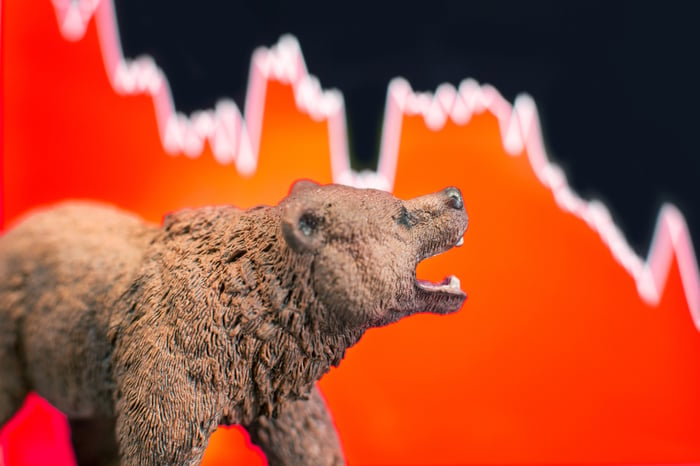It's incredible what a difference a relatively short amount of time can make on Wall Street. In 2021, all three major stock indexes logged multiple record-closing highs. But just one year later, the major indexes were plummeting into a bear market, with the Nasdaq Composite (^IXIC 1.02%) ultimately shedding 33% of its value.
While there's no question that big declines can be unnerving and shake investors' confidence, patience has a way of paying off on Wall Street. With the exception of the 2022 bear market, every double-digit percentage drop in the major indexes, including the Nasdaq Composite, has eventually been whisked away by a bull market rally. Buying high-quality stocks during these downturns has been a smart strategy over the long run.

Image source: Getty Images.
Even though the Nasdaq Composite has bounced significantly off of its 2022 lows, it remains close to 20% below its all-time high, which was set in November 2021. In other words, bargains can still be had among growth stocks.
What follows are three distinctive growth stocks you'll regret not buying in the wake of the Nasdaq bear market dip.
CrowdStrike Holdings
The first unique growth stock that's begging to be bought with the Nasdaq still well off its record-closing high is cybersecurity company CrowdStrike Holdings (CRWD 3.61%). Though there are concerns that a U.S. recession could lead to earnings multiple contraction for high-growth stocks like CrowdStrike, the company's key performance indicators show it's firing on all cylinders.
The first thing to understand about cybersecurity solutions is that they've evolved into a basic necessity service over the past two decades. Hackers and robots angling to steal sensitive information have grown more sophisticated and don't take days off just because the U.S. economy or Wall Street hits a rough patch. With businesses shifting their data online and into the cloud at an accelerated pace, it's third-party providers like CrowdStrike that are picking up the slack in any environment.
What makes CrowdStrike such a phenomenal business is its artificial intelligence (AI)-driven platform known as Falcon. Every week, Falcon is overseeing trillions of events. With the aid of machine learning, Falcon is growing more efficient over time at recognizing and responding to end-user threats.
The interesting thing about CrowdStrike is that it offers one of the pricier solutions available. But in spite of Falcon's higher cost, clients are sticking with the company. Over the past six fiscal years (CrowdStrike's fiscal year ends on Jan. 31), the company's gross retention has jumped more than 400 basis points to 98%.
Furthermore, CrowdStrike's more than 23,000 existing subscribers keep adding onto their initial purchases. Whereas a single-digit percentage of its customers had purchased four or more cloud-module subscriptions six years ago, 62% of its clients have purchased at least five cloud-module subscriptions as of its most recent quarter. These add-on sales are crucial for cash-flow generation and operating margin expansion.
Lovesac
A second distinctive growth stock that you'll be kicking yourself for not buying on the Nasdaq bear market decline is furniture stock Lovesac (LOVE -0.57%). Although furniture companies are traditionally slow-growing, Lovesac is turning an industry that's ripe for disruption upside down.
One of the biggest differences between Lovesac and traditional furniture retailers is (surprise!) its furniture. While it was once known for its beanbag-style chairs called sacs, modular couches known as "sactionals" now comprise almost 90% of net sales. Sactionals offer unparalleled function and come with more than 200 different cover choices to match the color scheme or theme of any living space. Furthermore, the yarn used in sactionals is made entirely from recycled plastic water bottles. In short, sactionals are a unique item that covers the gamut of function, choice, and eco-friendliness.
To build on the above, sactionals are also pricier than the typical sectional couch, but that's not a bad thing. By targeting a more affluent consumer, Lovesac is insulating itself against the impacts of inflation and mild recessions. High earners are less likely to change their spending habits during minor economic hiccups.
Another reason investors can confidently buy Lovesac is its omnichannel sales platform. Whereas most furniture retailers are brick-and-mortar-based and almost entirely reliant on foot traffic into their stores, Lovesac has been able to pivot a substantial percentage of its sales online. It also operates pop-up showrooms and has shop-in-shop or showroom partnerships with Costco Wholesale and Best Buy.
A forward-earnings multiple below 9 is a cheap price to pay for a company growing sales at a sustained double-digit rate.

Image source: Getty Images.
PubMatic
The third distinctive growth stock you'll regret not buying in the wake of the Nasdaq bear market dip is adtech company PubMatic (PUBM 1.18%). Even though ad spending has weakened considerably in the face of rapidly rising interest rates and growing worries about a possible U.S. recession, PubMatic brings undeniable competitive advantages to the table for its long-term shareholders.
PubMatic sits at the center of the biggest growth trend in advertising. It's a sell-side platform (SSP) in the digital ad arena. SSPs provide a platform that helps publishing companies sell their display space. Thanks to quite a bit of consolidation among SSPs in recent years, PubMatic is one of the few fast-growing and trusted names left. As of late March 2023, its market share of the sell-side industry had risen to between 4% and 4.5%.
Whereas eMarketer has estimated that global ad spend will grow by an average annual rate of 10% through 2025, PubMatic has consistently outpaced the industry's average growth rate. The reason for this is PubMatic's focus on connected TV (CTV) and video advertising. CTV -- i.e., streaming video content on a smart television -- should handily outpace the digital ad industry's average growth rate through mid-decade.
What's more, PubMatic made the wise decision, in hindsight, to design and build out its cloud-based programmatic ad infrastructure instead of relying on a third-party service. This decision is allowing the company to scale its business and lower its operating expenses as a percentage of net sales. Translation: Owning its own cloud-based programmatic ad infrastructure is a pathway to a higher operating margin than its peers.
With nine years (and counting) of positive operating cash flow under its belt, this small-cap adtech stock is ripe for the picking.





